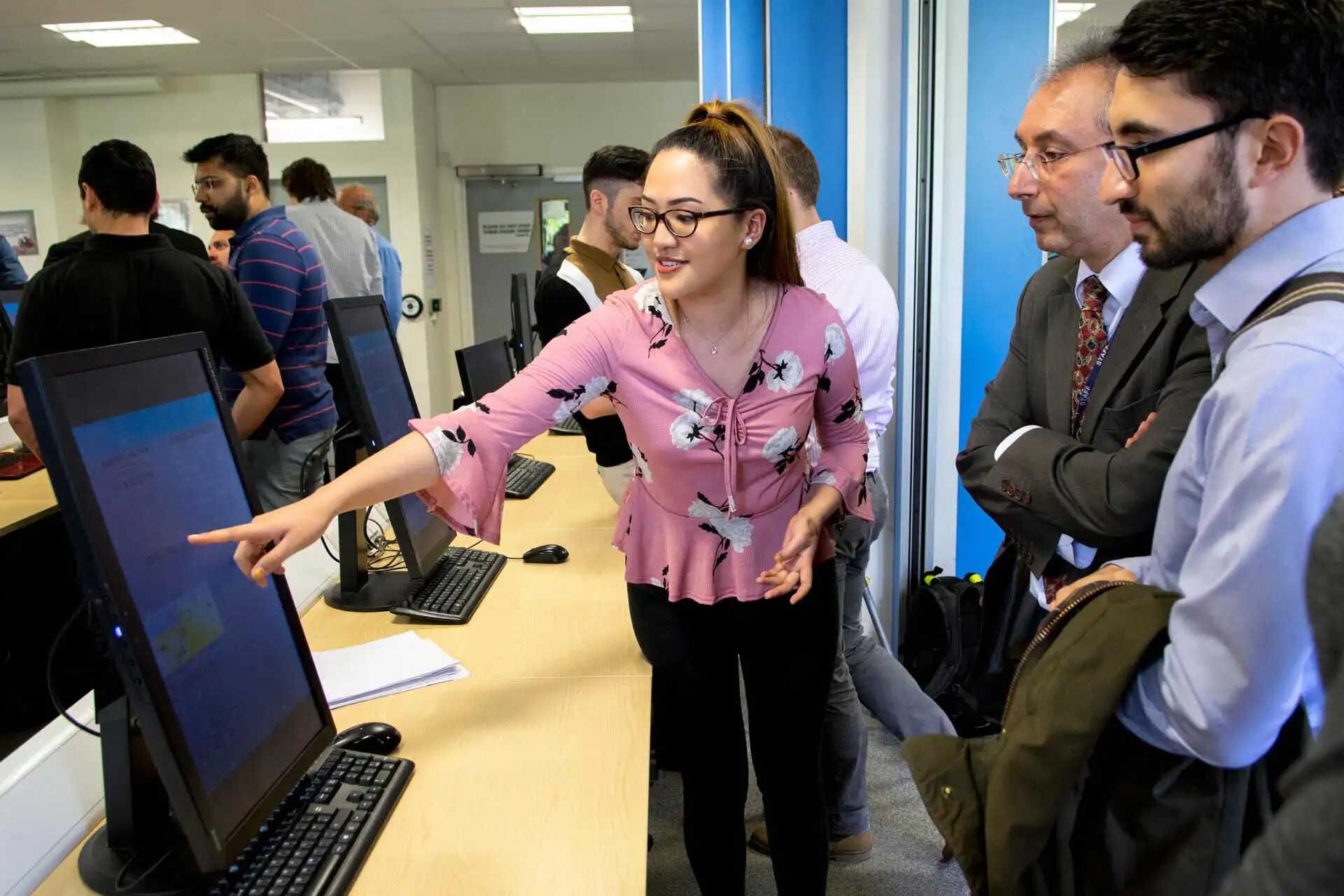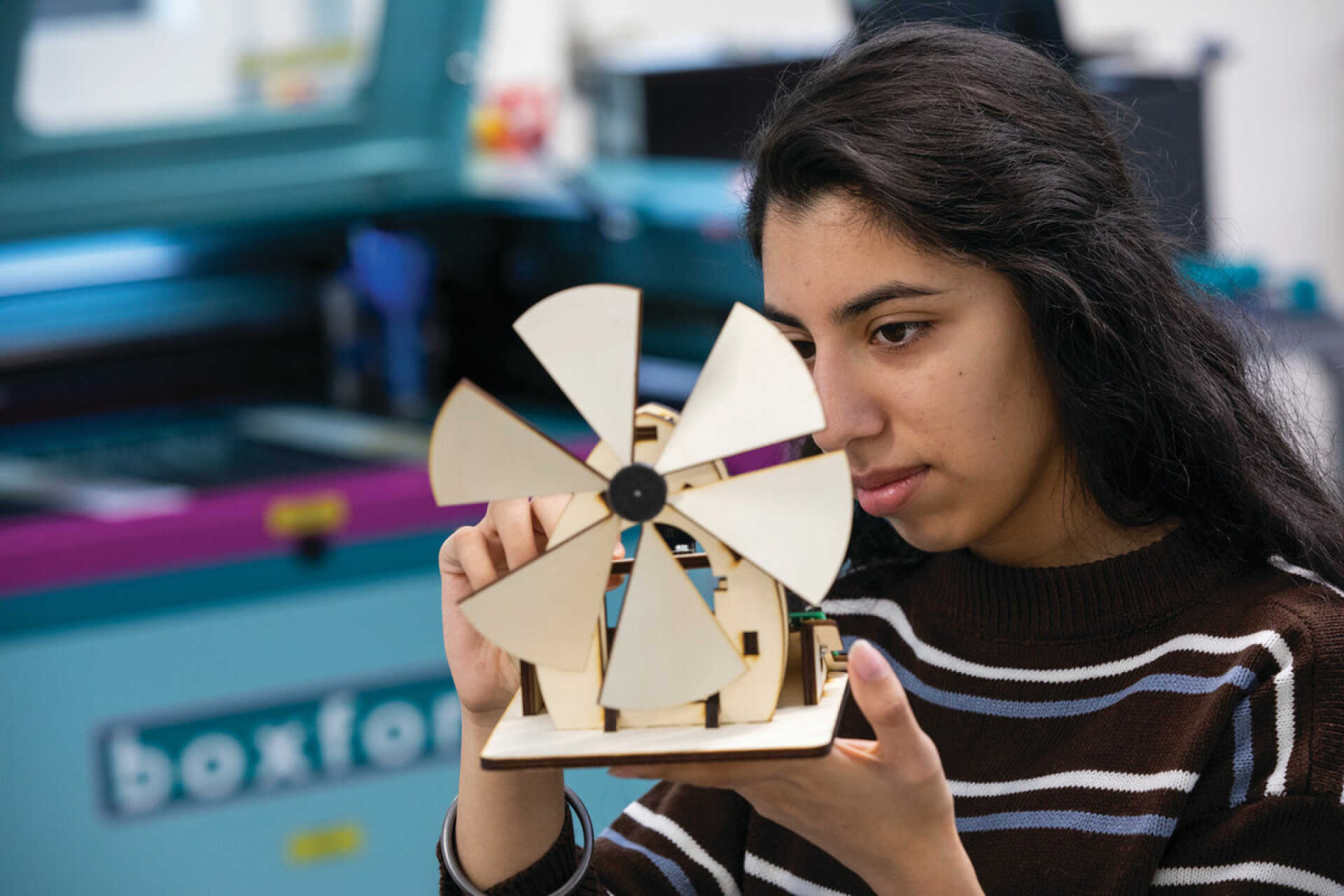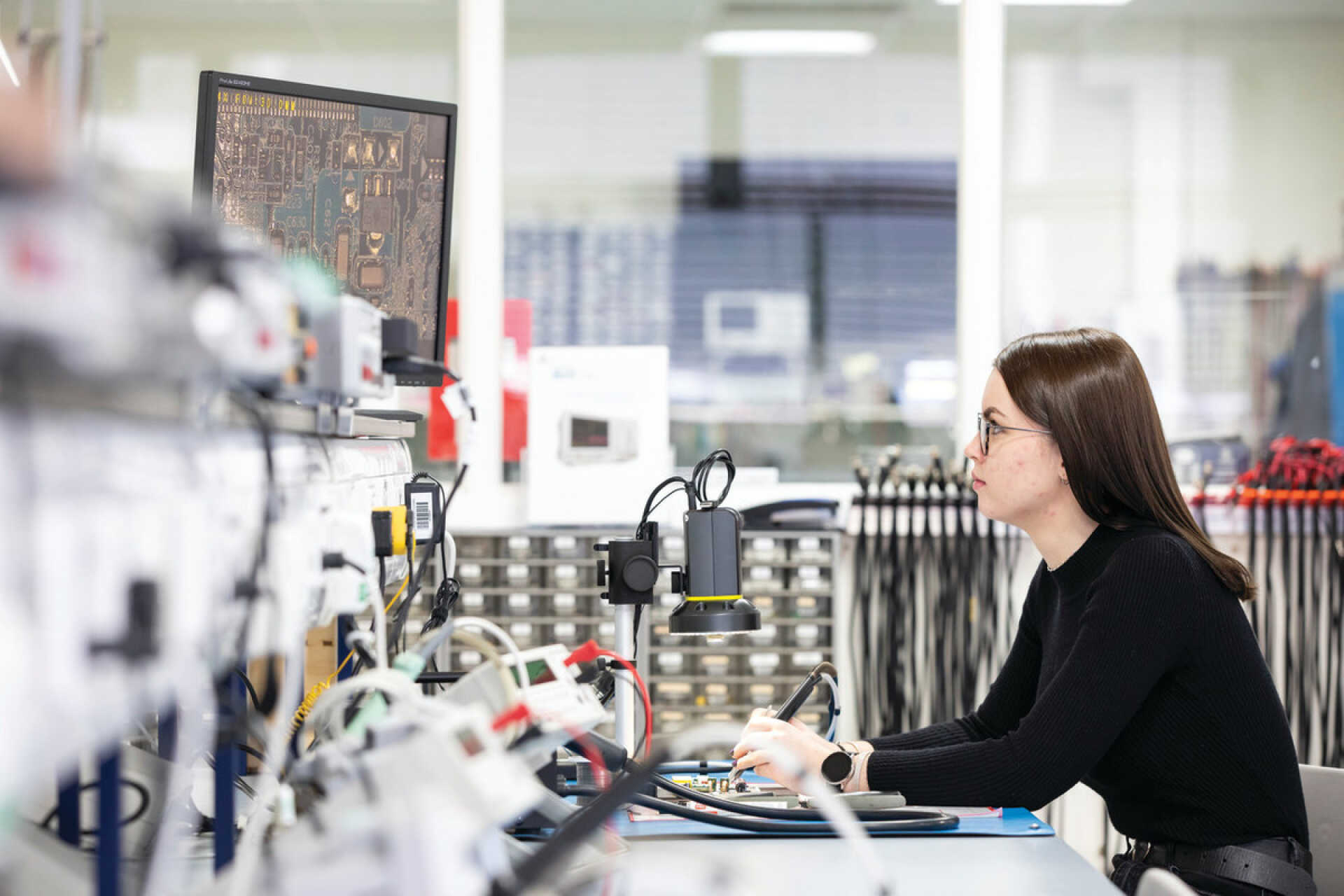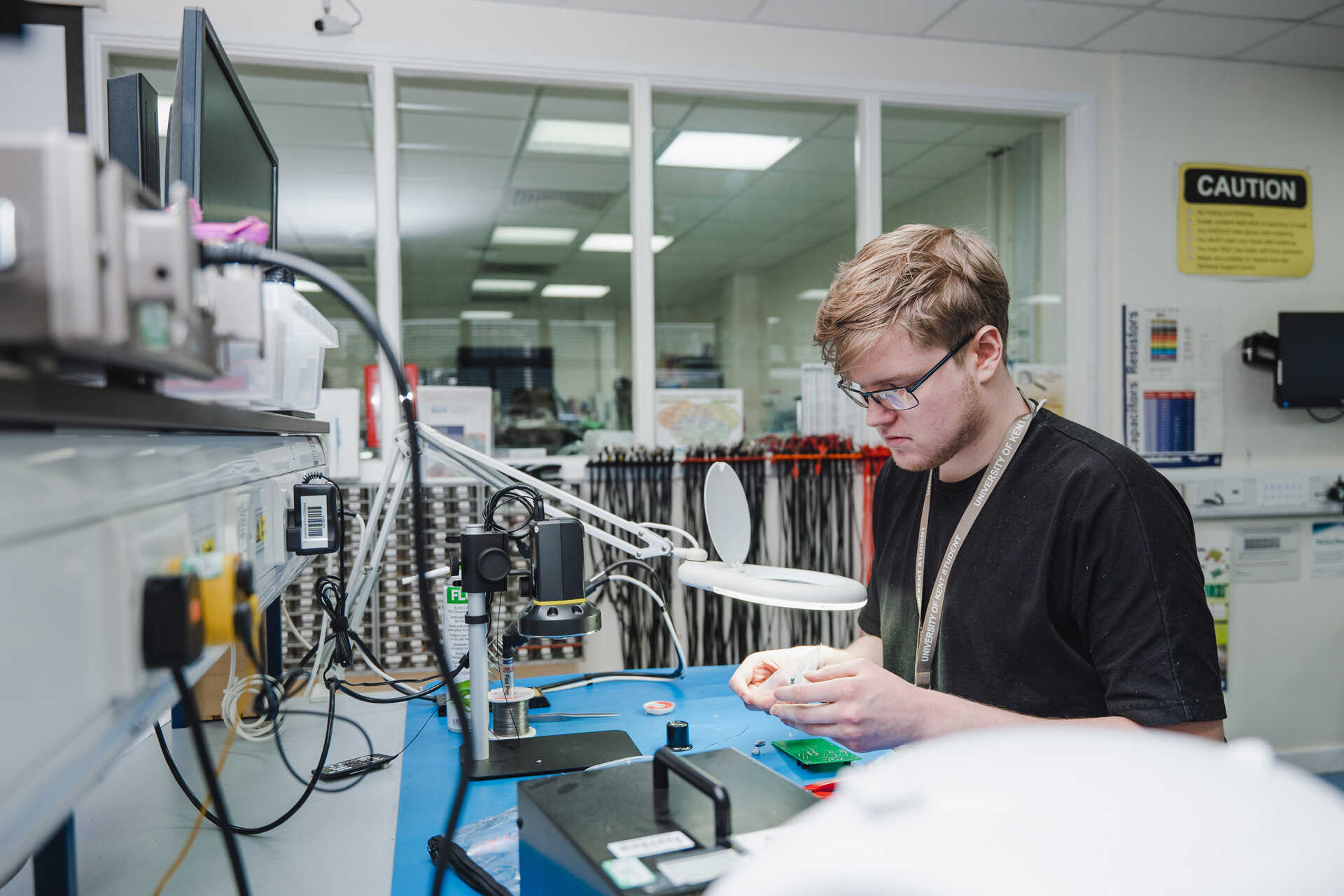Electrical and Electronic Engineering
Building a future with sustainable engineering strategies.

Building a future with sustainable engineering strategies.
Electrical and electronic engineering touches on almost every aspect of modern life, and with sustainability so important for the world right now, there’s never been a better time to study this area.
From renewable energy generation to smart power distribution and the development of low powered embedded devices, Kent will provide you with the specialist knowledge and broad skills in both disciplines; making you career ready for the future direction of engineering.

We have excellent industrial links, providing you with many placement opportunities.
You’ll benefit from research led teaching by leading academics and industry professionals.

First-class facilities to support your development with access to computer and engineering labs, mechanical workshop, dedicated makerspaces and more.
With tech rapidly advancing, there's a higher global demand for professional electrical and electronic engineers more than ever before.

You’ll study exciting subjects like power electronics, renewable energy technology, robotics and systems programming.
Our typical offer levels are listed below and include indicative contextual offers. If you hold alternative qualifications just get in touch and we'll be glad to discuss these with you.
BBB including B in Mathematics plus one other STEM subject.
DMM in an Engineering subject including Further Maths/Further Maths for Engineering Technicians. Other subjects are considered on a case-by-case basis. Please contact us for further advice on your individual circumstances.
120 tariff points from your IB Diploma, including Maths (not Maths Studies) at 5 at HL or 6 at SL, or Maths: Analysis and Approaches at 5 at HL or 6 at SL, or Maths: Applications and Interpretations at 5 at HL or 6 at SL, and a science subject at 5 at HL or 6 at SL, typically H5, H6, H6 or equivalent.
N/A
The University will consider applicants holding T level qualifications in subjects closely aligned to the course.
A typical offer would be to obtain the Access to HE Diploma in a suitable subject with a minimum of 45 credits at Level 3, with 24 credits at Distinction and 21 credits at Merit.
We consider all applications on an individual basis during Clearing and you're encouraged to get in touch to discuss your grades. You're most likely to be offered a place in Clearing for this course if you hold the following subjects:
The following modules are indicative of those offered on this programme. This listing is based on the current curriculum and may change year to year in response to new curriculum developments and innovation.
On most programmes, you study a combination of compulsory and optional modules. You may also be able to take ‘elective’ modules from other programmes so you can customise your programme and explore other subjects that interest you.
The module provides an introduction to the basic knowledge required to understand, design and write computer programs and the basic principles underlying the process of Software Engineering. No previous programming experience is assumed and the module proceeds via a sequence of lectures supported by simple exercises designed to give practical experience of the concepts introduced in the lectures.
The module provides techniques to design electronic circuits containing active and passive components and to appreciate the power issues and frequency response of circuits containing reactive elements. An introduction will be given to Electromagnetism for engineering purposes. An understanding of the fundamentals of Electronic Engineering is assumed and the module proceeds via a sequence of lectures supported by simple exercises designed to give practical experience of the concepts introduced in the lectures.
Mechanics:
Forces, moments and Equilibrium of rigid bodies, Work and energy, Elementary stress-strain analysis.
Engineering Design: Transformation of a client requirement into an engineering design statement, Decomposition and evaluation of design requirements, Consideration of the human and ergonomic factors in the design process, CAD based drawings and models via CAD tools, Realisation of CAD models using computer numerical control manufacturing machines
The module provides an introduction to the basic knowledge required to understand, design and work with basic electronic circuits and the basic principles underlying the process of Electronic Engineering. No previous electronics experience is assumed and the module proceeds via a sequence of lectures supported by simple exercises designed to give practical experience of the concepts introduced in the lectures. The underpinning aspects of professional practice are also introduced.
The module provides a first attempt to translate a problem into a technical solution. An understanding of the relevant programming/software, electronic and mechanical designs to create a functional solution centred around a microcontroller will be developed. Design skills will be applied to define and fabricate the physical solution informed by the original requirement. An understanding of the fundamentals of programming, electronic and mechanical aspects is assumed and the module proceeds via lectures, workshops and labs supported by supervision and technical advice. It is designed to give practical experience of the concepts introduced in the lectures of the prerequisite modules.
This module provides an introduction to contemporary digital systems design. Starting with the fundamental building blocks of digital systems the module outlines both theoretical and practical issues for implementation. Practical work includes the use of digital simulation and analysis software for implementing real-world problems.
Mathematics is the fundamental language of engineering, allowing complex ideas to be formulated and developed. This course provides the sound basis of mathematical techniques and methods required by almost all other modules in the department's engineering courses. Topics covered include functions, set theory, complex numbers, calculus, linear algebra, statistics and probability.
This module expands on introductory mathematics and provides students with the appropriate mathematical tools necessary for the further study of electronic, mechanical and computer systems. The main emphasis of the course is in applied calculus, which is used to solve real-world engineering problems, and the mathematics software MATLAB.
You take all compulsory modules.
Engineers work in interdisciplinary teams to overcome the challenges of intelligent engineering systems. Smart engineering systems are not simple mechanical or electronic components, but the result of synergistic integration between mechanical engineering, electronics, computer science and control.
You’ll learn to apply this interdisciplinary approach to develop innovative solutions that would not be possible with a single-discipline focus. You’ll gain applied knowledge of sensors, actuators, and data acquisition techniques which are crucial to modern engineering. After mastering the foundational concepts, you’ll progress to cover transducers, mechanical components and modelling of mechatronic systems.
You’ll further explore microprocessors and data acquisition processes and become familiar with actuator functions within mechatronic systems. Practical sessions will complement your theoretical learning, allowing you to apply concepts in hands-on scenarios with real-world systems.
Microcomputer technology is widely used in the design and development of modern computer systems. Many of us use such applications every day, in devices such as smartphones, washing machines, microwaves and cars.
In this module, you’ll learn general principles of computer architecture and understand how the microprocessor executes instructions, interacts with hardware components and communicates with memory and I/O devices. The most common microprocessors and microcontrollers will be to compare their architectures and processing resources.
You’ll also learn a programming language that can be used on a number of microcontrollers and discover how to program and compile on a given microcontroller through a series of practical sessions. As part of a mini-project, you’ll then design and develop a microcontroller-based system using its I/O features and different communication protocols (such as RS232, SPI and I2C).
Power electronics is the study and application of electronic devices and circuits for efficient control and conversion of electrical power. This module gives you an overview of the fundamental principles of power electronic devices and their applications in various electrical systems.
First, we’ll introduce you to power semiconductor devices, including power diodes, thyristors, and insulated gate bipolar transistors (IGBTs), uncovering their unique characteristics and operational intricacies. This will then lead to rectifier circuits such as half-wave and full-wave rectifiers converting AC to DC power as well as exploring the intricacies of Buck, Boost, and Buck-Boost converters, and their role in transforming DC power.
You will then unravel the mysteries of inverter circuits for DC-AC conversion. Finally, you’ll explore the diverse landscape of power supplies, from linear to switch-mode designs, giving you insight into their design principles and practical implementation.
Power electronics forms the backbone of modern electrical systems, including renewable energy systems, electric vehicles, consumer electronics, industrial automation, and many more. Understanding power electronics will provide a strong foundation for working with these advanced technologies.
What are the principles and applications of various electrical machines that are commonly used in engineering and industrial settings?
Through theoretical lectures, workshops, and hands-on laboratory sessions, you’ll delve into the fundamental concepts underlying the functioning of electrical machines. These include motors, generators, and transformers, and you’ll also gain the knowledge and skills necessary to analyse, design, and optimise electrical machines for diverse engineering applications.
This will prepare you for careers in electrical engineering, power systems, renewable energy and related fields.
Teamwork lies at the heart of this module, seamlessly blending practical group projects with supporting lectures, emphasising the development of technical proficiency, transferable skills, sustainability, and security awareness. You will collaborate in teams to explore mechanical and electronic hardware, software development, entrepreneurship, and sustainable practices. Through hands-on project work, you will gain expertise in sensor data acquisition, programming, hardware design, understanding security protocols, and integrating sustainability principles. Additionally, you will address crucial topics such as innovation, financial management, intellectual property protection, and commercialisation strategies with a sustainable and security-oriented perspective. By merging technical knowledge with entrepreneurial insight, sustainability principles, and a focus on security, this module equips you with a comprehensive toolkit for navigating the complexities of modern innovation and enterprise securely and sustainably.
You take all compulsory modules and select one from a list of optional modules.
Programmable logic devices are an essential element of modern digital design. Unlike a microcontroller that is software programmable (but otherwise comprises a fixed set of hardware resources), programmable logic devices such as Field-Programmable Gate Arrays (FPGAs) entail re-programming of the hardware itself. As such they allow fast prototyping and flexibility in the hardware design of modern digital systems (ranging from telecoms to control systems) due to their ability to be reprogrammed in the field.
In this module, you'll learn to program in a hardware-description language (VHDL) to model and simulate digital electronic circuits. Through a series of practical sessions, you will learn the necessary electronic design automation tools and how they are used to compile and simulate VHDL code but also “synthesise” VHDL code for placement onto actual physical hardware. You'll also learn the fundamental operational principles of programmable logic devices, FPGAs and their main processing elements, and also how modern FPGAs are used to build system-on-chips (SoCs). You will be introduced to the concepts of boundary scan testing and learn about the JTAG protocol (IEEE standard 1149.1). You'll apply knowledge gained in mini projects that will involve designing complete digital systems implemented onto FPGA, deepening your understanding and building your experience.
Want to learn the fundamentals of how power systems create and distribute energy? This module covers the concept of power generation and transmission using interconnected grid systems, overhead and underground power transmission and distribution systems.
You’ll learn the fundamentals of designing, operating, and analysing modern electrical power transmission and distribution networks. You’ll do this by concentrating on models and techniques used to describe and analyse the behaviour of such systems as well as the specification of major equipment used in such systems. You’ll then consider the stability of power grids and identify the techniques for their protection.
What sources of renewable energy are there? How are technological developments improving electrical generation and meeting the global rise in demand for clean energy?
After exploring the impact of fossil fuels on our environment, you’ll get an overview of various renewable energy sources and their associated challenges and opportunities. We’ll then focus on some major sources – like solar energy and wind power technologies – in more detail.
You’ll also briefly look at other renewable energy sources such as wave and tidal, hydropower and geothermal and get a brief overview of energy storage. By the end of the module, you’ll have a strong sense of which technologies are being proposed to meet the world's growing demand for green energy.
Teamwork lies at the heart of this module, seamlessly blending practical group projects with supporting lectures, emphasising the development of technical proficiency, transferable skills, sustainability, and security awareness. You will collaborate in teams to explore mechanical and electronic hardware, software development, entrepreneurship, and sustainable practices. Through hands-on project work, you will gain expertise in sensor data acquisition, programming, hardware design, understanding security protocols, and integrating sustainability principles. Additionally, you will address crucial topics such as innovation, financial management, intellectual property protection, and commercialisation strategies with a sustainable and security-oriented perspective. By merging technical knowledge with entrepreneurial insight, sustainability principles, and a focus on security, this module equips you with a comprehensive toolkit for navigating the complexities of modern innovation and enterprise securely and sustainably.
Image analysis techniques give computers the power to enhance, interpret and understand visual inputs. They are integral to many applications such as autonomous vehicles, medical diagnosis, document processing, biometric security, surveillance, etc.
You’ll learn the principles of image analysis techniques alongside their practical applications. Starting from basic image formation and acquisition, you’ll learn core image processing techniques such as how to filter noise, how to extract object outlines, how to identify regions of interest in an image (segmentation), and about image feature descriptors.
At the same time, you’ll be exploring various supervised and unsupervised classification techniques (including neural networks) for object recognition. You’ll study several real-world applications of image analysis and also learn through lab-based exercises and a mini-project.
Embedded systems in conjunction with the Internet of Things (IoT) are used to create systems that can sense in real-time different aspects of their environment, collect and transmit information for a vast number of applications including smart cities, smart agriculture and smart factories (Industry 4.0). This information can then be used to transform the day-to-day operation of our cities and businesses making them more efficient and less wasteful of resources.
This module introduces the theory and practice of employing computers as the control and organisational centre of embedded systems and examines time-critical systems. You'll also cover design aspects of embedded systems and IoT through practical work, including real-time operating systems and microcomputer programming.
You will learn how to use the internal peripherals of a microcontroller by working directly at the hardware register level and as such gain a good understanding of the interactions between software and hardware. Many practical applications of embedded systems require real-time operation under strict deadlines (e.g., in factory automation). As such, the module also covers the concepts of real-time operating systems and features that are essential for time-critical operation. IoT can be used as the backbone communication infrastructure in embedded applications and the skills and knowledge you develop will be crucial in your future career.
In today's interconnected world, cyber security is not just important – it is essential. From businesses to schools, homes, personal devices, and even vehicles, everything is connected! This module dives deep into the fascinating realm where cyber security – including general topics and specialist areas such as cryptography – take centre stage.
Get ready to explore how these fields shape the modern technology landscape, from fundamental security principles to the intricate dance between risk management, cybercrime, usable security and professional aspects. You'll unravel the mysteries of ciphers, delve into the world of symmetric and asymmetric cryptography, and even take a critical look at cyber-attacks. You'll also examine their social and technical dimensions and explore effective risk treatment measures. This includes robust security controls and the use of upcoming mechanisms such as cyber insurance.
The knowledge you will gain on this module provides a strong foundation to guide and inform security efforts within an organisation. Prepare to embark on a journey where every click, every byte, and every line of code matters – and where you knowledge can make a real difference.
Delve further into electronic engineering topics covering the principles and operation of essential electronic components and systems. You will learn about different passive and active electronic components (e.g., passive and active filters) focusing on both theoretical and practical aspects pertaining to the design of modern analogue and digital systems including frequency response characteristics, power-consumption and noise. You will learn about modern digital Integrated Circuit (IC) design at the circuit, chip/silicon and board level, through an introduction to the metal-oxide-semiconductor field-effect transistor (MOSFET) and Complementary MOS (CMOS) logic. You will also learn the principles of microwave technology, including the design of microwave filters and transmission lines. A sequence of lectures are supported by example classes, exercises and workshops which give you practical experience of the concepts introduced in the lectures.
Most modules consist of a mixture of lectures, seminars, practicals, workshops and computer sessions. Project work throughout all three years gives students experience of a wide range of practical design, manufacturing and testing skills; laboratory experiments and computer-based assignments. The hands-on experience of hardware and software design you receive replicates industrial practice to maximise your employability when you graduate.
For a student studying full time, each academic year of the programme will comprise 1200 learning hours which include both direct contact hours and private study hours. The precise breakdown of hours will be subject dependent and will vary according to modules.
Methods of assessment will vary according to subject specialism and individual modules.
Please refer to the individual module details under Course Structure.
For programme aims and learning outcomes please see the programme specification.

Engineering graduates find employment in a huge range of sectors such as:

For students continuing on this programme, fees will increase year on year by no more than RPI + 3% in each academic year of study except where regulated.*
The University will assess your fee status as part of the application process. If you are uncertain about your fee status you may wish to seek advice from UKCISA before applying.
For details of when and how to pay fees and charges, please see our Student Finance Guide.
Find out more about accommodation and living costs, plus general additional costs that you may pay when studying at Kent.
Kent offers generous financial support schemes to assist eligible undergraduate students during their studies. See our funding page for more details.
You may be eligible for government finance to help pay for the costs of studying. See the Government's student finance website.
Scholarships are available for excellence in academic performance, sport and music and are awarded on merit. For further information on the range of awards available and to make an application see our scholarships website.

We have a range of subject-specific awards and scholarships for academic, sporting and musical achievement.
We welcome applications from students all around the world with a wide range of international qualifications.

Student Life

In the QS World University Rankings 2024, Kent has been ranked 39th within the UK and is in the top 25% of Higher Education Institutions worldwide.
Kent Sport
Kent has risen 11 places in THE’s REF 2021 ranking, confirming us as a leading research university.

Guaranteed when you accept your offer at Kent.